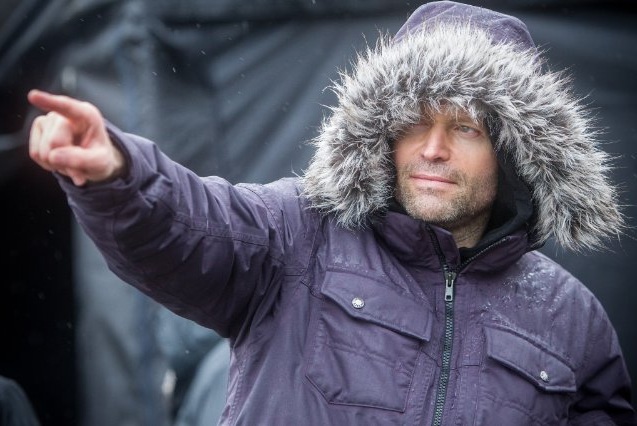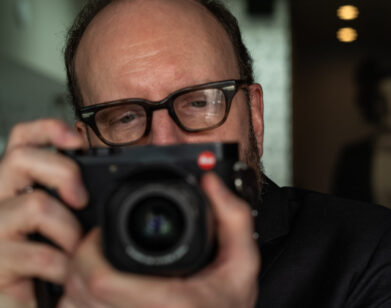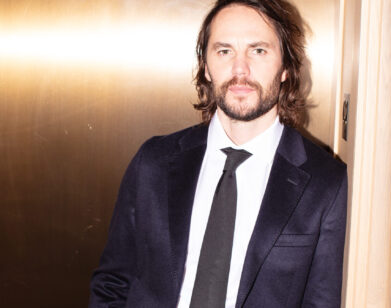Marc Forster: The Eye of the Swarm

ABOVE: MARC FORSTER ON THE CHILLY SET OF WORLD WAR Z. IMAGE COURTESY OF PARAMOUNT PICTURES
Don’t judge the walking dead solely on their affinity for devouring human flesh. Iconic filmmaker George A. Romero used his Night of the Living Dead zombies symbolically, in a larger social commentary on the political and economic landscape of the 1960s. Decades later, director Marc Forster (Monster’s Ball) is picking up where Romero left off with his latest blockbuster, World War Z.
Adapted from Max Brooks’ cult classic of the same name, World War Z stars Brad Pitt as Gerry Lane, a former United Nations employee who is enlisted to weed out the source of a global zombie pandemic threatening to devastate mankind. But unlike Romero’s undead, Forster’s zombies operate under the laws of swarm theory: a complex, self-organized system whereby one’s behavioral patterns are influenced by a larger group. Similar in nature to a colony of ants or a flock of birds, Forster’s zombies are most volatile in their ability to quickly gather as a collective unit in pursuit of a common goal. The result is worldwide terror, and as the story always goes, time is running out.
A fresh contribution to the zombie canon, Marc Forster’s World War Z offers a staunch commentary on the devastating effects of modern day overpopulation. And while the steady depletion of natural resources may not moan or go bump in the night, Forster’s under the microscope look at mankind’s long-term ramifications is a real-life horror show that, unfortunately, can’t be solved in 116 minutes. As it turns out, zombies may not be the scariest thing after all.
JAMIE LINCOLN: You’re no stranger to directing adaptations or big blockbuster hits, but given that Max Brooks’ novel of the same name developed what’s often described as a “cult following,” did you feel as though you had to retain certain elements of the book in order to appease fans?
MARC FORSTER: One of the main reasons I wanted to work on World War Z was because I’m a huge fan of the book, and I love the idea of taking a non-linear story and creating a three-act structure out of it. Max, in his book, created such a compelling world. I just thought it would be great to take from that a creative film that really stands on its own two feet. It would have been very hard to adapt the book—impossible, even—into a film as it is.
LINCOLN: Had you met with Brooks prior to filming?
FORSTER: I met with him a couple of times, yeah.
LINCOLN: And what was his take on a film adaptation?
FORSTER: He was really pleased; really excited that I would take on the book to make a movie out of it, but I think that’s something you should probably ask him. [laughs]
LINCOLN: [laughs] Fair enough. So if George Romero’s zombies were, in part, a metaphor for consumerism, what are your modern-day zombies representative of?
FORSTER: For me, I was always really interested in swarm theory and how that would relate to the telling of the story. It was something as a kid I was really interested in; I grew up looking at a swarm of fish, a swarm of birds, for instance. Scientists who study swarm theory look at groups—birds, and fish, and ants—they all communicate with each other. Even cancer cells, at a certain point, shift and behave as a group or a swarm. I thought the book had incredible imagery for a swarm—almost like an army of zombies—coming toward you. That image for me was a metaphor for overpopulation; we’re going after the last resources because there are more and more people, and ultimately the planet can’t sustain that.
LINCOLN: Are you a glass-half-empty kind of guy? You’ve been quoted as saying it’s key today that “we never lose our fear of being oppressed by a more forceful, uncompromising entity.” Why live in fear?
FORSTER: I think people, unfortunately, do live in constant fear. I think the government—and people in general—create scenarios people fear, because ultimately through fear you can control people. I wish we could live in a world where there would be no fear, but it’s a driving force in many decisions people make these days, whether it’s personal, economic, or even job-related. A lot of people stay out of fear in a job they hate.
LINCOLN: Moving into zombie territory, in my mind, the stereotypical image of a zombie is a slow-moving, moaning creature. Do your zombies break with tradition? Are they adaptable? Intelligent?
FORSTER: No, they are not intelligent. When you see the film, you’ll see different zombies—some of them are moving very slowly, and some of them are moving quite fast. When you watch the movie, you’ll see why and when and so on.
LINCOLN: In choosing projects, you’ve said it’s important for you to tell stories that resonate with you. First off, what drew you into World War Z, and what kind of story are you looking to impart to viewers?
FORSTER: For me, World War Z was such a great movie because on one hand, it’s this big popcorn film that can make for a really wide appeal. At the same time, I felt there’s no better metaphor than the zombies themselves for the times we live in. Both of those qualities come very seldomly that I feel like there’s a substance to the film I really appreciate even in a subtle way; that really excited me.
LINCOLN: Today, making movies has become a bit of a numbers game, insofar as an opening weekend projection can predict the “success” or “failure” of a film. Do you ever get concerned about that sort of thing?
FORSTER: Not really, because I can only do the best that I can do. I love the film. I’ve seen it with an audience, and I know the film works, so whatever marketing… it’s out of my hands, basically. I can’t get hung up on that because otherwise ultimately I become fear driven. [laughs]
LINCOLN: [laughs] Right, we wouldn’t want that. I’m interested to hear your opinion on CGI. Do you enjoy working with it?
FORSTER: Yes. I think it’s just another tool. For certain stories, it’s a great tool to use.
LINCOLN: Was it more difficult to capture widespread hysteria, given that your actors had to act that much more?
FORSTER: It’s sort of a mix between CGI and real. I kept on mixing it up, also to have the CGI-artists work harder on their images because if you mix it up with real images they have to match that, so I found it really accentuated everything.
LINCOLN: Your body of work spans multiple genres. Do you have a particular preference? Why not stick to just one?
FORSTER: I always think it’s interesting to switch genres, because if I read a script and I know exactly how to manifest a story, I don’t really want to do it anymore, because I’ve already done it in my head. It becomes less interesting. If I read something that’s challenging, I get really passionate and usually fall in love with it, because I feel I need to do it. I need to tell the story; I need to find a way to make it happen.
LINCOLN: Having worked with some of the biggest stars in Hollywood, what’s it like to direct Brad Pitt, versus a child, or newcomer to the industry?
FORSTER: Brad Pitt is such a gifted and iconic actor; he’s so incredibly talented that when you work with someone like that—I’ve worked with Johnny Depp, and many other actors of that same caliber—they have incredibly strong intuition and connection with their character and the way they portray it. It’s a different approach when dealing with someone like that, or with a child, who you’ve tried to cast as natural as possible. When you’re working with children, for instance, you have to make sure they’re not really trained actors, or overly trained. Part of the goal is inhabited in the character. With some of these big stars, you’re discussing the character, and the piece, and depth prior to filming and you agree on each by going through scenes. Then you start shooting, and unless you’re really stuck, or a scene doesn’t work, you start reshaping it and changing it, but often after the first couple of weeks, they’ve found the character and it falls into place.
LINCOLN: After looking at the film come together, you decided to rewrite and reshoot the ending. Are you happy with the outcome?
FORSTER: Yes, I’m really, really happy with the outcome. The movie now ends on a reflective note, as most of my films do. In a sense, traditional big action movies go out with a big bang, but I felt a more quiet and reflective ending was more appropriate for this film.
LINCOLN: As a director, do you have any goals you’d like to achieve in the industry? Is an Oscar considered the highest honor?
FORSTER: Some of the greatest directors never got an Oscar, like Kubrick, or Hitchcock. For me, personally, I think the body of work is more important than winning an Oscar.
LINCOLN: If directing is work, what do you consider play?
FORSTER: [laughs] I think directing is part play, part work, not just all work, because I think you always have to play. I think that’s ultimately why I got into making movies, is because I love to play.
WORLD WAR Z IS OUT TOMORROW, JUNE 21.






